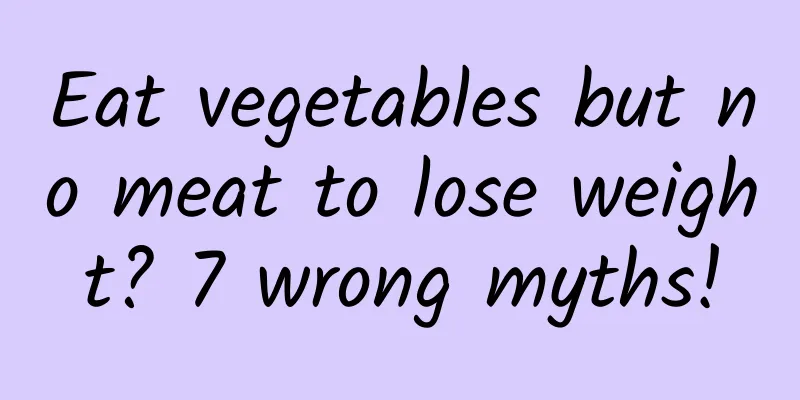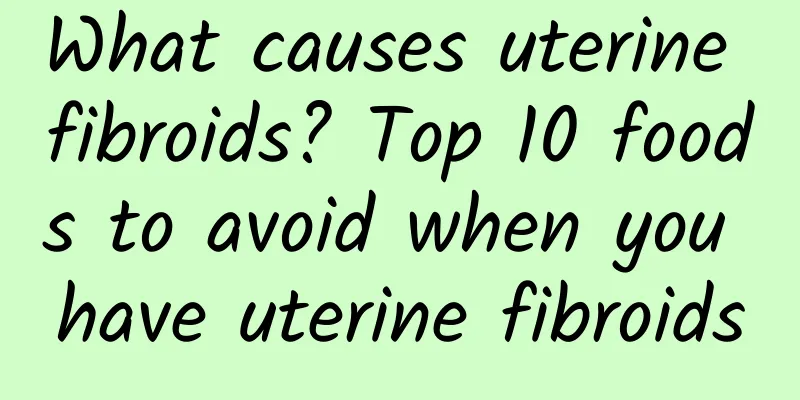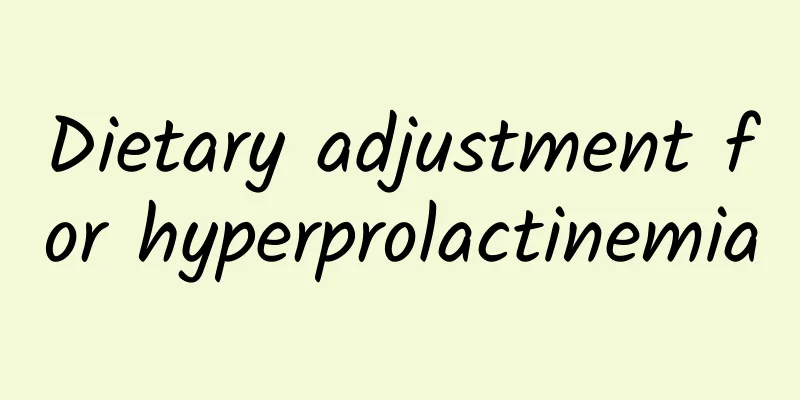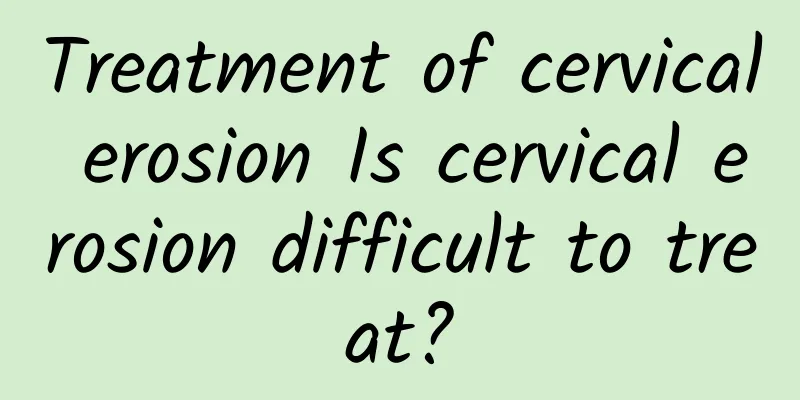Eat vegetables but no meat to lose weight? 7 wrong myths!

|
"Can you lose weight by eating vegetables instead of meat?" A survey by the National Health Administration found that 1/4 of obese people think they can lose weight by eating less meat, and even 1/3 of the public believe that "eating vegetables and meat instead of noodles and rice" or "reducing food portions" can help them lose weight. The National Health Administration emphasizes that weight loss requires perseverance, and if you can master the principles of "eating smart, exercising happily, and weighing yourself every day", you can lose weight correctly and healthily. There is a myth among Chinese people that they should eat vegetables but not meat to lose weight. Experts emphasize that low-calorie diet can easily cause physical harm and should not be underestimated. According to a telephone survey conducted by the National Health Administration's Healthy Weight Management Program, the most common weight loss methods used by Taiwanese people include: "increasing the amount or type of exercise" accounting for 59.44%; "eating vegetables and meat instead of rice and noodles" accounting for 31.0%; "reducing food portions" accounting for 29.73%; "eating vegetables but not meat" accounting for 25.4%; and "special diet (such as high-protein diet, low-sugar diet, etc.)" accounting for 8.32%. [7 myths about rapid weight loss]: 1. The diet of eating vegetables and meat: that is, the high-protein, low-calorie method, will cause nutrient imbalance, may lead to ketoacidosis, easily cause damage to the kidneys and brain, and in severe cases may cause death due to electrolyte imbalance. 2. Eat vegetables but no meat/only eat fruits to lose weight: This is an extremely low-fat, extremely low-calorie diet to lose weight. For example, only eating blanched vegetables and fruits will lead to a lack of essential fatty acids, resulting in reduced utilization of fat-soluble vitamins, muscle loss and other damages. 3. Fasting method: It may cause deficiency of various important nutrients. In addition to causing weight loss too fast and muscle loss, it may also cause damage to the kidneys and brain. 4. Diet meal packs: expensive, lack of normal diet, monotonous, and insufficient dietary fiber. 5. Illegal diet pills: Illegal diet pills often contain amphetamines, laxatives, diuretics, thyroxine and other drug ingredients. After taking it, it is easy to cause adverse reactions, such as: headache, excitement, insomnia, restlessness, nausea, vomiting, diarrhea, abdominal pain, palpitations, muscle weakness, mental confusion, kidney failure, weakness, paralysis, irregular heartbeat, and even the risk of death. 6. Use of slimming creams, fat pushing sticks, and tights: These often cause skin allergies, dermatitis, and other injuries, and wearing tights is more likely to cause poor blood circulation and result in pressure sores. 7. Use thread embedding, ear acupuncture, and acupuncture: Traditional Chinese medicine weight loss often uses stimulation of acupoints to suppress appetite or interfere with specific acupoints to accelerate metabolism. However, if a healthy diet and regular exercise are not practiced, weight loss effects cannot be achieved, and it must be carried out under the evaluation of a professional physician. Improper medical treatment, wound management, and incompletely sterilized acupuncture needles and catgut may lead to allergic reactions or wound infections. By weighing yourself at a fixed time every day, you can monitor changes in your weight at any time and remind yourself to maintain a healthy weight. Director-General Chiu Shu-ti of the National Health Administration emphasized that currently more than 50% of Taiwanese men are overweight or even obese, and the same number of women is as high as 36%. The biggest reason is frequent eating out and lack of exercise. Therefore, it is recommended that people should "eat smartly, exercise happily, and weigh themselves every day" in order to lose weight correctly. 1. Eat smartly: Eat more natural ingredients such as vegetables, fruits, unrefined whole grains and roots; drink more boiled water, avoid sugary drinks, limit the intake of high-energy-density foods (especially processed foods that are high in sugar, low in fiber, and high in fat); avoid the intake of processed meat products and reduce the consumption of high-salt and salted foods, and develop a healthy eating pattern of a balanced diet. 2. Happy movement: In addition to reducing calorie intake, weight loss also requires increasing physical activity to burn calories. If overweight and obese people can reduce their daily intake by 500 calories, or reduce their food intake by 300 calories, and increase physical activity to burn 200 more calories, they can lose about 0.5 kg per week. Sufficient physical activity is an important key to preventing "weight regain" and maintaining a healthy weight. 3. Weigh yourself every day: Weigh yourself at a fixed time every day to monitor changes in your weight at any time and remind yourself to maintain a healthy weight. Once your weight increases, you should review your recent diet and physical activity, and try to practice the above "smart eating, happy moving" tips to avoid becoming overweight or obese. |
<<: Beautiful slimming! 4 essential vitamins
>>: Healthy weight loss! High-protein, high-fiber diet
Recommend
What are the indications for drug treatment of uterine fibroids?
The treatment of uterine fibroids depends on the ...
How to treat recurrent miscarriage
How to treat recurrent miscarriage? When treating...
Treatment of Acute Bartholinitis with Integrated Traditional Chinese and Western Medicine
Bartholinitis is an inflammation caused by infect...
How to learn to prevent vulvar leukoplakia?
The appearance of vulvar leukoplakia causes certa...
Can’t get rid of summer obesity? Beautiful Chinese medicine practitioner "pat pat slim" reduces fat and detoxifies...
In summer, you love to use air conditioning, drin...
Precautions after medical abortion
Although medical abortion is a small matter, you ...
I had a miscarriage. What can I eat to get rid of the blood?
Bleeding after miscarriage is part of the natural...
What are the specific dangers of irregular menstruation?
Many female friends do not pay much attention to ...
What are the precautions for abortion and what are the methods of abortion?
Abortion can cause great harm to a woman's bo...
How to calculate menstrual period after abortion?
Experts say that after an abortion, the endometri...
Warning: The dangers of chronic pelvic inflammatory disease cannot be ignored
Chronic pelvic inflammatory disease is one of the...
How to treat severe cervical erosion with drugs
Severe cervical erosion means that the eroded are...
What foods can be eaten to treat pelvic peritonitis
I believe that many people are already familiar w...
What vegetables can prevent uterine fibroids? What vegetables can help uterine fibroids?
What vegetables can prevent uterine fibroids? Ute...
More than 20% of school children have pot-shaped waists and suffer from chronic diseases when they grow up
Is your baby a fat child? Chinese people are accu...









